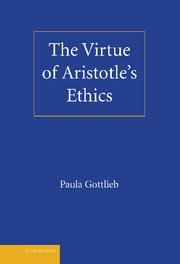Book contents
- Frontmatter
- Contents
- Preface and Acknowledgments
- Abbreviations
- Introduction
- PART I ETHICAL VIRTUE
- 1 Virtue in the Mean
- 2 Nameless Virtues
- 3 The Non-remedial Nature of the Virtues
- 4 Listing the Virtues
- 5 Uniting the Virtues
- PART II ETHICAL REASONING
- Conclusion
- Appendix: Uniting the “Large-scale” Virtues
- Select Bibliography
- Index
3 - The Non-remedial Nature of the Virtues
Published online by Cambridge University Press: 29 September 2009
- Frontmatter
- Contents
- Preface and Acknowledgments
- Abbreviations
- Introduction
- PART I ETHICAL VIRTUE
- 1 Virtue in the Mean
- 2 Nameless Virtues
- 3 The Non-remedial Nature of the Virtues
- 4 Listing the Virtues
- 5 Uniting the Virtues
- PART II ETHICAL REASONING
- Conclusion
- Appendix: Uniting the “Large-scale” Virtues
- Select Bibliography
- Index
Summary
It is often thought that what is distinctive about ethical virtues is that they are meant to remedy certain defects, either in human nature or in the world, or both. These views are supposedly linked with the idea that if human beings were perfect, or if they lived in a perfect world, there would be no need for ethical virtues. In this chapter, I argue that Aristotle's ethical virtues are not essentially remedial. This is especially clear in the case of the nameless virtues I discussed in the previous chapter, but remedial interpretations are also at odds with aspects of Aristotle's doctrine of the mean, discussed in Chapter 1, and his famous function argument. The view that Aristotelian ethical virtues are not essentially remedial is therefore an important thesis in Aristotle's ethic of virtue. It contributes to Aristotle's account of particular virtues, to be explained in Chapter 4, and it also supports Aristotle's humanism, to be further elaborated in Chapter 6.
Modern proponents of remedial views often trace their position back to Aristotle. For example, Philippa Foot in “Virtues and Vices” says that the “virtues should be seen as correctives” and she suggests that Aristotle would agree. Christine Korsgaard in an influential paper, “Aristotle and Kant on the Source of Value”, argues that, according to Aristotle, the ethical virtues only have conditional value. In Korsgaard's words:
One can center one's life around, say, justice in fighting for oppressed people or courage in the military life or political and practical wisdom in making laws for the city. For an individual such an activity is a final good, for the virtuous person does these things for their own sake. […]
- Type
- Chapter
- Information
- The Virtue of Aristotle's Ethics , pp. 52 - 72Publisher: Cambridge University PressPrint publication year: 2009

